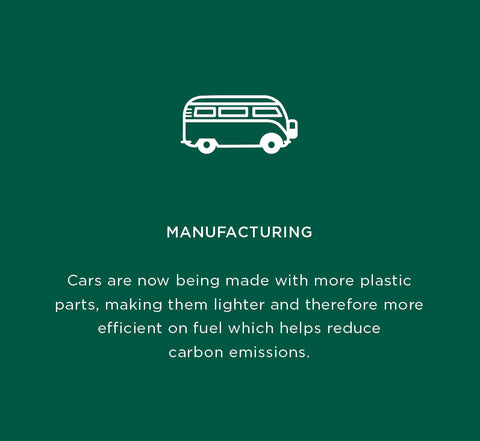
TIME TAKEN FOR A COFFEE CUP, CAN, NAPPY, PLASTIC BOTTLE AND FISHING NET TO DEGRADE
However, it’s our attitude to plastic that is so cripplingly wrong, rather than the material itself. It is irresponsible to assume that something that’s taken hours to make and precious resources to build, like a plastic bag or a coffee cup, is fine to use for just 5 minutes and then discard. Whatever happened to cherishing our belongings?

If you’re reading this thinking “old news, I’m already using a shampoo soap bar, carrying my keep cup and water bottle and death staring the barman if he puts a plastic straw in my drink", then unfortunately you’re in the minority. And whilst it’s incredible that some of us are (organic) cottoning on to the single use problem, as a nation and as a planet we have a long way to go. We need to start valuing longevity over convenience.
Let’s take a look back at the historical journey of plastic and at some of the crucial benefits that we’ve gained from inventing this multi-purpose polymer...as it might just make us respect its usage a bit more.
WHAT ACTUALLY IS PLASTIC?
Plastic is a polymer, a long chain of molecules which, if it’s a synthetic polymer, is typically made up of carbon atoms from petroleum coming from the oil industry. Plastic can also be made from shale gas, a natural gas which is fracked to produce small plastic pellets which can then be moulded into hundreds of different types of plastic.
Cheap American shale gas is now flowing freely to the UK and it’s supercharging plastic production. In a recent BBC documentary, ‘War on Plastics,’ it was uncovered that fracking for shale gas has made natural gas really cheap, and as a result it’s made plastic feedstock really cheap too and this is driving a huge expansion in the plastic industry.
From the beginning of this century plastic production has doubled from 200 million tonnes per year to 400 million tonnes.
SO WHAT GOOD HAS PLASTIC DONE?
Let’s talk cucumber condoms for a second, or in other words, the shrink wrap made from polymer plastic film that protects the cucumber’s skin from shelf to table. With something like 17.4 billion people to feed we need our food to stay fresher for longer in order to decrease the actual amount that our planet has to produce. The plastic wrap on a cucumber can extend its shelf life by 14 days. Every year about 600,000 pacemakers are fitted which are insulated by a plastic polymer, plastic seat belts reduce the risk of injury to car drivers by 45% and truck drivers by 60%, and cars are now being made with more plastic parts, making them lighter and therefore more efficient on fuel thereby helping to reduce carbon emissions.




IT'S CLEAR THAT THE PLASTIC ISSUE IS NOT BLACK AND WHITE
...and that actually what we need is a perspective shift to really value and appreciate the vital use of plastic in our modern day lives (personally we feel the jury is still out on the cucumber condom), so that we can begin to change our mentality towards this clever polymer. Value the necessary uses of plastic, change your attitude to single use, recognise that plastic isn’t the problem and that it’s our fundamental throw away attitude that really is.
HERE'S OUR GUIDE TO SOME DAILY QUICK WINS TO DECREASE YOUR SINGLE USE:
CUTLERY
We love this reusable cutlery set from Joseph Joseph. It is magnetic so all of the utensils stick together, stainless steel so easy to keep clean and it comes in a silicone casing that keeps it sleek and easy to transport. Keep this on your desk at work or in your handbag.
REUSABLE TAMPON APPLICATOR
D is the world’s first reusable tampon applicator. For every kilometre of beach in the UK there are 9 plastic tampon applicators to be found. With D, you’ll never have to throw one away again. It is made from medical grade sanipolymers so all you need to do is rinse under the tap after use and it fits all non-applicator tampons from lite to super plus.
LUNCH ON THE GO
We love Stasher bags because they are light and easy to transport and they have a tight seal so there’s no chance of your lunch leaking into your bag. They’re made from silicone which means that they are dishwasher, oven and microwave safe too. Great for small snacks or a big salad.
A BAG FOR YOUR BAG
Carrying a foldable reusable bag is the number one most useful thing you can do to decrease your single use. For all those times when you’re out and expecting not to buy anything, and then realise you need milk, having one of these squirrelled away is a great idea. Pick one up at your local Waitrose when you’re stocking up on DAME’s organic cotton tampons!








